Mega 98.3 Buenos Aires
Argentina 1999 |
|
In 1999, Rick
Cummings, VP-Programming of Emmis Communications asked me to consult a new
station acquisition in Buenos Aires, Argentina. |
 |
For the next five years, I spent
three weeks a year in Argentina working with the Emmis stations, as
well a s doing airchecks and conferences via
phone and the internet. |
|
The stations
acquired by Emmis, in association with the previous owner, were an
AM and FM combo in Buenos Aires, a metropolitan area of over 17 million
population. |
I had been in Buenos Aires many times before, going
back to frequent trips int he 60's to find new music for my station
in Ecuador.
Here is a 1981 picture from a visit to record shop for Música en
Flor. |
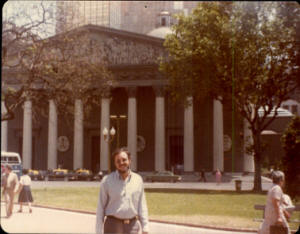 |
 |
The FM, called FM
News because it was the only FM with newscasts, had a format of
English-language adult contemporary music and no ratings. Perhaps
this was because they had over 2,800 songs in rotation! |
|
As is usual with
bad stations, they go away. Before that, all the normal perceptual
and format search research was conducted. The result was a new
format based on Spanish-language rock and playing only songs by
Argentine artists. |
|
.jpg)
Andy Bloom, in-house consultant and me
at the Mega launch at 1 PM on April 24, 2000. |

Mega had a simple position: Pure
Argentine Rock. Surprisingly, this format had never been done
before despite the genre being the leading one in music sales. |
Mega was the
first 100% "Rock en Español" station in the world,
and featured only songs by Argentina's many rock artists,
covering three decades of Rock Nacional. |
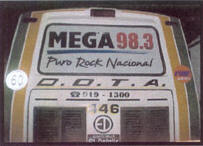
To see Mega 98.3 event
promotions click on the bus! |
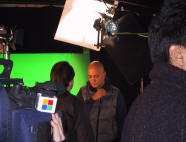
Mega TV Commercials
Click on the picture of the set! |
Hear a Mega contest promo.
Click on the radio
|
 |
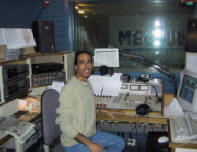 |
Click on the
studio photo
to the left to see the
studios and some of the
offices of Mega as they
were in 2000. |
|
In
June, 2000, IBOPE Argentina, S. A. released the ratings for
the month of May in Buenos Aires (population:15,000,000)
and the #1 station in
persons 20-54 is Mega 98.3 with a 15.03 share. In April, the station
had less than a 2 share. Mega made its debut on April 24, 2000 at 1
PM, only 6 and a half days before the May IBOPE survey began! |
|
Here is a Mega
sales sheet
showing the ranking of the
first 5 FMs in Buenos Aires.
Mega debuted at #1 just
40 days after going on the
air in April, 2000.
Mega continued
throughout
my involvement to
maintain its #1 position
over all competitors.
Click on the page to the right
for a PDF file of the entire 2000
sales kit for Mega 98.3 |
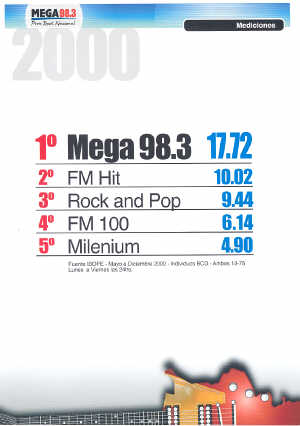 |
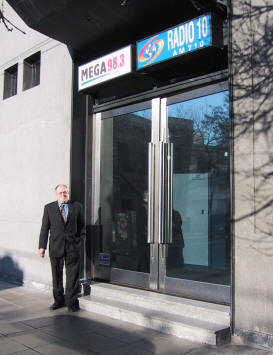 |
In
the three-month averages for May-July, Mega had a 17 share, #1 by a
wide margin in this huge market with over 30 licensed radio stations
and as many as 50 quasi-official "local stations" and outright
pirate operations. (The #2 station managed a low 11 share)

Click here for a PDF
of the Emmis ratings Press Release.
Displacing all other stations, Mega made the strongest and fastest
debut in the history of Argentine radio. After two years, it remains
firmly #1 |
|
Press Comments |
|
 |
Mega went on the air
in
late April of 2000.
It was an instant success.
Here are some
interesting
comments form the local press,
including what
leading daily Clarín
said about Mega on July 28, 2000.
"An American company
discovered that Argentines
like national rock!"
Click on the Clairn Front Page
to the left to read a translation. |
 |
|
Mega shares this building in the Palermo section of Buenos Aires
with Radio 10, the city's #1 AM station. Here we can see the Radio
10 AM studio which faces the street so listeners can drive by and
watch the popular announcers do their talk shows.
|
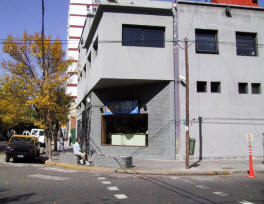 |
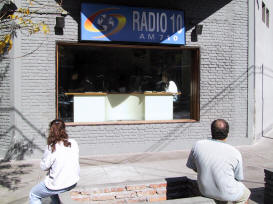 |
Radio 10 is Argentina's most powerful AM commercial station, with
100,000 watts on 710 AM. In about 2 years on the air, when Emmis
made the purchase it had achieved total dominance among a field of
over 10 AM talk stations in no small part due to the guidance
of founder and morning host Daniel Hadad. Mr. Hadad repurchased the
stations in 2005 when the local economy obligated Emmis to divest
the stations. |
|
The Radio 10 studio looks through bullet-proof glass out at
the corner of Uriarte and Nicaragua in the Palermo section of Buenos
Aires. As can be seen from the number of microphones, some of the
shows might have as many as 6 to 8 participants. |
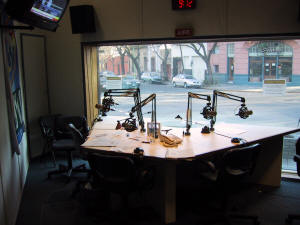 |
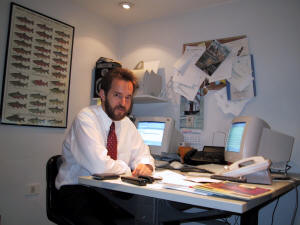 |
Radio 10 News Director
José Luis Pagano in his office.
This was a formidable job; just the morning news and commentary show
had over 20 staffers, including a news writing staff and reporters. |
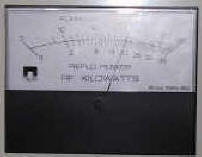
Click on the Power Output
Meter (showing 100 kw)
to see the Radi0 10
transmitter site. |
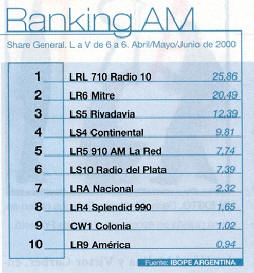 |